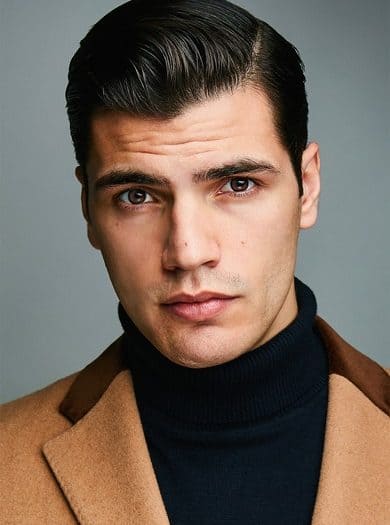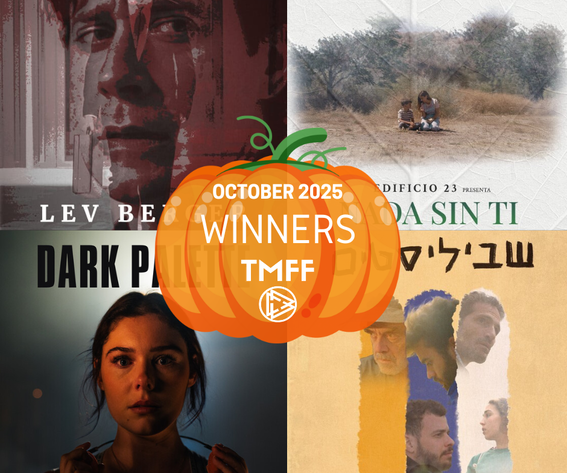It’s already November, and last month’s big winner was Tony, a French film about a Spanish immigrant that faces difficult choices on multiple fronts. We were very impressed with the quality of our newest Film of the Month, and thus decided to seek out director Hugo Diego Garcia and ask him a few more questions on his project.
JL: Many congratulations for your awards, Hugo! We found your film to be one of the best entries to our festival in recent months, and we’re very happy to see projects of such quality in our lineup!
Hugo: Thank you. I’m really happy and grateful that you liked the movie.
JL: What are your defining characteristics as a director?
Hugo: I don’t really know. Tony is my first film and I wanted to tell this story more than anything. Then it was also about acting in it. I was trying things and also copying movies I liked. But, if I had to define my “style” I’d say slow motion, music, and tension, basically.
JL: How did you come up with the idea for Tony?
Hugo: It’s a personal story inspired by my family and friends. I woke up in May and I wrote it in a day. Then I kept refining it day after day, getting pieces of advice from my friends and family including my co-producers Pietro Mercieca who’s acting in the film too, Jordan Evrard, Malo Garcia, the composer, and my father.
JL: Any famous filmmakers that you’ve looked at for inspiration for the making of Tony?
Hugo: I’d say Refn, since Drive is the movie that blew me away the most. Scarface from De Palma for the Latin vibe and costumes. Then I’d say Kim Chapiron, Romain Gavras and the excellent music videos of The Blaze recently for French references. But I’m a huge fan of so many great directors I admire so much. I just didn’t use them for this specific movie but I want to work with them. Like pretty much everyone I admire giants such as Scorsese, Tarantino, Fincher, Eastwood, and Spielberg but my favorite directors are Denis Villeneuve, Steve McQueen, Nicolas Winding Refn and Scott Cooper. I want to work with them so guys if you read that…
JL: Where is Tony set, and where did you shoot the film?
Tony: Tony is set in France, in Oyonnax, a little industrial town in the mountains formerly known as the Plastics Valley because it was a leader in the plastic business in the 80s.
JL: The film is set in the 80s, and captures that particular vibe very well. How well do the project’s overarching themes translate in the context of today’s societal issues?
Hugo: The 80s vibe was essential for this movie. I don’t think it would work as well if it was set nowadays. The themes are very current, just explored through another demographic group in this particular film.
JL: We loved the soundtrack, and the fact that it serves not only in setting the mood, but is also a vehicle for the storytelling. How important was the music in telling Tony’s story?
Hugo: The music was key in the film. I would have never done it without having my brother (and excellent young composer) Malo Garcia. The music is as important as the acting and writing and without it, Tony would be really incomplete. It really lifts the movie up and gives it its tone, emotions, and particular vibe. It’s really Tony‘s biggest strength for me.
JL: How would you describe your protagonist, Tony, in a few words?
Hugo: Well, Tony is a very complex character because of his ambivalence. He’s a smart and nice kid with character. Being abused, humiliated and abused by his father his whole life made him violent and led him to fight early. Growing up in a very violent environment made him tough. His particularity though is his consciousness and intelligence that made him realize he’s taking the wrong path. He knows how wrong the things he and his “gang” are committing, but one side of him belongs to this world so he follows them.
JL: Congrats on winning the Actor of the Month award as well! How did it feel to direct and act at the same time? Do you usually prefer acting over directing or the other way around?
Hugo: Thanks! It was very challenging because I had so many tasks to do and I was heavily featured. I’d say I prefer acting but directing gives you some control. Although directing yourself is tough, you at least know how to please the director 😉
JL: Have you already planned any future projects, or are you currently concentrating all your attention on marketing Tony?
Hugo: I have ideas but nothing concrete. I’m marketing Tony as much as I can. Also, I want Tony to be a feature or a show. Its potential resides in its long version. I think the short format was reductive for Tony, his arc and the story I wanted to tell. But, I’m an actor first and foremost, so I hope Tony will interest directors who will want to work with me in my actor’s capacity.
JL: Thank you very much for your time, Hugo! We at TMFF wish you all the best for your future projects, and hope to see more of your work soon!
Hugo: Thank you.









Leave a reply